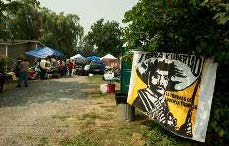Let’s Intensify and Broaden the Struggle to Mobilize Directly for Communism
SUMAS, WASHINGTON (USA) —Lucia’s husband saw farmworkers walking down the road with their suitcases on August 8th. “Well, go pick them up!” Lucia said. He did. Soon eighty strikers were camped out in Lucia and Joaquin Suarez’s backyard.
Leadership like this will be an everyday occurrence after a communist revolution. Leaders like Lucia (and there are many) deserve communism and nothing less.
Four Seattle members of the International Communist Workers’ Party (ICWP) visited the strikers, Lucia, Joaquin and their three children. We brought cash donations from comrades and other Boeing workers and our communist newspaper Red Flag.
Both were enthusiastically welcomed. Everyone read Red Flag on the spot. A relatively new comrade, born in Mexico (like the farmworkers) urged them to take extra copies. They did, distributing them to those coming and going from the Suarez’ yard.
Our new comrade is now more enthusiastic about communism… and more confident about his ability to show how communism is the only answer to escalating racist exploitation.
Strikers Focus on Healthcare
The farm owners, part of the behemoth Munger Farms agribusiness, decided they had better send the strikers home to Mexico. Support was building as far south as Portland, OR (284 mi, 458 km away).
Still, six strikers remained. They needed blood tests. The pesticides had made them so ill they weren’t allowed on the planes.
The death of Honesto Ibarra sparked the strike. The company literally worked him to death. They would not let him rest when he complained of debilitating headaches (see Red Flag, Vol. 8 #10).
Another worker was paralyzed over half his face. Most of the 600-person crew of immigrant workers were suffering from one ailment or another. Many were sick from pesticides.
The strikers had demanded a medical clinic on the farm. Of course, the bosses refused.
That led us into a discussion about the “barefoot doctor” program that started after the revolution in China. It continued into the early ‘70s, until the defeat of the Cultural Revolution. It spread from the fields to the factories.
Beijing General Knitwear Factory workers described the healthcare they fought for in 1971: “Our factory has an infirmary, and in every shop, there are barefoot doctors…If sick workers cannot be properly treated in the factory, they are immediately sent to the hospital.”
Barefoot doctors were trained in medical science six months out of the year, but continued to work in their shops. They identified medical conditions before they became emergencies. Communist healthcare like this would have prevented Honesto’s death.
Most importantly, barefoot doctors mobilized workers, who they knew intimately, for safe conditions. In communism, for instance, they would help give political leadership to find alternatives to pesticides or to make sure they didn’t pile up.
The woman who had organized meals at the strike camp had complained to management that they weren’t giving the workers enough food. They got what amounted to a few “kids’ meals” for a 14-hour day in the hot, smoky fields. She refused to starve the workers. The bosses fired her. She became a strike leader.
Honesto had diabetes. You can’t survive with diabetes without a proper diet.
Here again, communist barefoot doctors would help mobilize workers to guarantee a proper diet. Those who fought for good, nutritious meals would assume more leadership, not get fired!
A Summer of Struggle
The strikers organized two caravans to pull more workers out on strike. When the strikers showed up, the bosses drove the remaining workers away in buses.
Lucia cut one off with her van. The bosses marched the workers back to the barracks.
More workers may walk out, so strikers and supporters are preparing Lucia and Joaquin’s yard just in case. Whatever happens, Lucia’s children have learned valuable lessons this summer that they can share with classmates.
Our party also learned valuable lessons, in part from making many mistakes. We should have asked more Seattle workers to join our trip to Sumas. The Boeing discussions were great (see box) but we could have organized more communist activities in the shop.
We’ll not make these mistakes again. We know who to ask to bring our communist message to every struggle. In good part, our base will develop into the communist leaders we need through their own experiences mobilizing for communism.
This fall marks the 100th anniversary of the communist–led revolution in Russia. Our area will hold a potluck on November 4th to mark the occasion. Let’s use it to intensify our struggle to mobilize our base for communism directly—today.
From the Field to the Factory

Farmworkers encampment in Sumas, WA
When a comrade at Boeing returned to work, other Boeing workers wanted a report on our party’s visit to the striking farmworkers. Soon our friends in the factory were also heatedly discussing communist healthcare.
Boeing has safety monitors throughout the plants, but they are powerless. Why? Because profits are in command.
Barefoot doctors, of which there were a million in China, sparked great advances in healthcare for the masses. Why? Because, at least for a while, communist politics were in command.
Millions fought with all they had to make this aspect of communist health the wave of the future. But communist politics could not prevail while capitalist (socialist) production dominated.
The material basis of communist power lies in organizing production for collective need, not profits. The whole societal superstructure that mobilizes masses to make decisions and carry them out rests on the communist organization of work.
Power comes initially from a communist revolution, but that’s not the end of it. The party must continue to use the experience of collective work to mobilize the working masses to transform every aspect of society.
The lessons of the mass struggle that revolved around barefoot doctors are priceless. This history calls upon every one of us to mobilize for communism directly.

